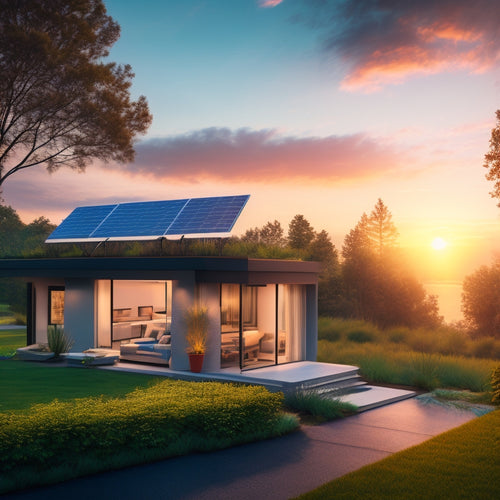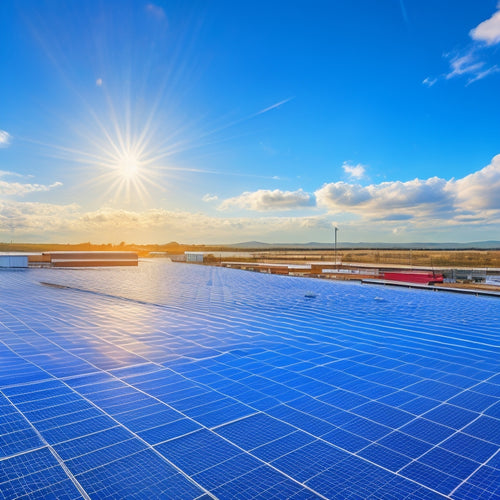
5 Best Home Water Systems for Independence
Share
You're looking to break free from municipal water supplies and want to investigate the best home water systems for independence. Consider utilizing sunlight for clean water through solar distillation, or rainwater harvesting systems that reduce your water bills and environmental impact. Off-grid water purification methods, like gravity filtration and bio sand filters, remove impurities effectively. Self-sustaining well water systems provide a reliable supply, while solar-powered filtration solutions guarantee clean water in remote locations. By assessing the benefits of these systems, you'll be well on your way to achieving water independence - and there's more to uncover about each of these innovative solutions.
Key Takeaways
- Solar-powered filtration solutions provide clean water independence by harnessing renewable energy and advanced filtration technology.
- Off-grid water purification methods, like gravity filtration and bio sand filters, offer reliable water treatment without grid reliance.
- Rainwater harvesting systems reduce water bills, decrease stormwater runoff, and increase water independence for households.
- Self-sustaining well water systems promote economic development and energy independence in rural areas with consistent well flow and maintenance.
- Solar distillation techniques remove contaminants and pathogens, creating clean drinking water and reducing reliance on traditional energy sources.
Harnessing Sunlight for Clean Water
As you investigate alternative methods for purifying water at home, consider utilizing sunlight, a free and abundant resource, to sanitize your drinking water.
Solar distillation techniques can be an effective way to remove contaminants and pathogens from water. By heating water using sunlight, you can create steam, which can then be condensed and collected as clean drinking water.
Additionally, photovoltaic water pumping systems can be used to power water purification systems, providing a reliable and sustainable way to access clean water. This approach can help reduce the strain on traditional energy sources, as solar energy utilization enables sustainable water purification.
Furthermore, implementing energy-efficient designs and optimizing system performance can further minimize the environmental impact of water treatment.
Rainwater Harvesting Systems Explained
Capture rainwater runoff from your rooftop with a well-designed rainwater harvesting system, a cost-effective and eco-friendly way to supply water for various household needs. You can collect and store rainwater for non-potable uses like flushing toilets, washing clothes, and irrigating your garden.
| Collection Techniques | Rainwater Storage | Benefits |
| Roof Catchment | Above-ground tanks | Reduces water bills |
| Gutter System | Underground tanks | Decreases stormwater runoff |
| Downspout Connection | | Increases water independence |
| First Flush Device | | Lowers water treatment costs |
| Leaf Guards | | Enhances water security |
Off-Grid Water Purification Methods
Your off-grid lifestyle demands a reliable source of clean drinking water, and that's where off-grid water purification methods come in.
You'll want to take into account gravity filtration systems, which use gravity to force water through filters, removing impurities and contaminants.
Additionally, rural areas can benefit from renewable energy solutions like solar power to power their water purification systems, promoting energy independence.
Bio sand filters are another effective option, using a combination of biological and physical processes to purify water. These filters contain layers of sand, gravel, and biological components that remove pathogens, metals, and other pollutants.
Both methods are effective at removing bacteria, viruses, and parasites, making them suitable for off-grid water purification.
When choosing an off-grid water purification method, take into account factors such as flow rate, maintenance requirements, and contaminant removal capabilities to guarantee you have a reliable source of clean drinking water.
Self-Sustaining Well Water Systems
Reliability is key when it comes to your off-grid water supply, and self-sustaining well water systems offer a dependable solution. You can count on a well to provide a consistent flow of water, as long as you perform regular well maintenance. This is especially important in rural areas where energy poverty rates are higher due to limited grid access.
Furthermore, having a reliable water supply can promote economic development and energy independence, much like off-grid energy solutions. This includes monitoring water levels, checking for signs of contamination, and performing routine inspections.
Regular water testing is also vital to guarantee the water is safe to drink. By testing for parameters like pH, total dissolved solids, and bacteria, you can identify potential issues before they become major problems.
With a self-sustaining well water system, you'll have peace of mind knowing your water supply is secure and dependable, even when the grid goes down.
Solar-Powered Filtration Solutions
Solar power can greatly improve the functionality of your off-grid water system, particularly when it comes to filtration. By utilizing solar energy, you can power advanced filtration technology that removes impurities and contaminants from your water supply.
This integration allows you to access clean drinking water without relying on grid electricity. Solar-powered filtration solutions typically consist of photovoltaic panels, a DC water pump, and a filtration unit.
The solar panels generate electricity, which powers the pump to push water through the filtration system. This setup enables you to enjoy a consistent supply of clean water, even in remote or off-grid locations.
With solar-powered filtration, you can guarantee your family's health and well-being while maintaining independence from municipal water sources.
Frequently Asked Questions
Can I Install a Home Water System Myself or Do I Need a Professional?
Like attempting to maneuver a puzzle blindfolded, DIY installation can lead to costly mistakes. You'll likely need professional assistance to guarantee a seamless setup, as 80% of DIYers encounter issues with water pressure or filtration, according to a recent study.
How Often Should I Test My Home Water System for Contaminants?
You should test your home water system regularly, ideally every 6-12 months, to guarantee it's contaminant-free; common culprits include lead, copper, and bacteria, so set a schedule to monitor water testing frequency and stay on top of your system's performance.
Are Home Water Systems Expensive to Maintain and Repair?
You'll find that home water systems' maintenance costs vary, but regular filter replacements and occasional part swaps keep repair frequency low, with average annual costs ranging from $100 to $300, depending on system complexity and usage.
Can I Customize a Home Water System to Fit My Specific Needs?
You can customize a home water system to fit your specific needs by choosing custom filtration options and modular system designs, allowing you to tailor your system to address unique contaminants and flow rates in your water supply.
Do Home Water Systems Come With Warranties or Guarantees?
You'll typically find that home water systems come with warranties or guarantees, offering protection against defects and performance issues; common warranty types include limited lifetime, 5-10 year, and conditional warranties, with guarantee periods ranging from 1-5 years.
Related Posts
-

Is This the Future of Alternative Energy Systems
Yes, alternative energy systems are shaping the future of energy. Innovations in solar and wind technologies are driv...
-

The Future of Residential Energy Storage
The future of residential energy storage looks promising and cost-effective for you. With lithium-ion battery prices ...
-

Commercial Solar Energy
As you consider powering your business with commercial solar energy, you'll uncover it offers a triple benefit: signi...


